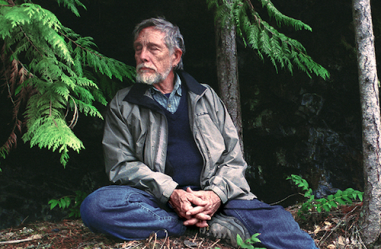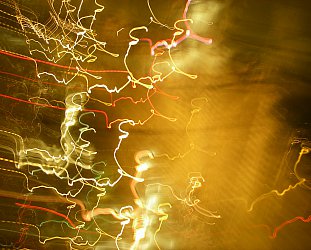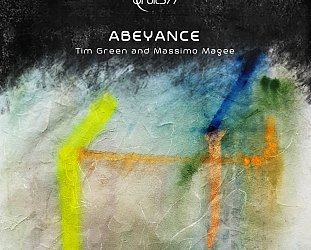Graham Reid | | 4 min read

This week the great American poet/essayist and translator Gary Snyder – who won the Pulitzer Prize for Poetry half a century ago – turned 95.
Snyder was often associated with the Beats (he emerged at the same time, shared some beliefs, Ginsberg and others were his friends) but he was always different.
He wasn't urban but grew up on farmland in the Pacific Northwest and Nature was always a distinctive part of his life and work.
He respected the land and those who had occupied it before him.
And following that great project of America, “go west, young man”, he – who already lived west – went west across the broad Pacific to Japan and China where he found lifestyles, poetic traditions and Buddhism.
He translated, learned calligraphy, studied the great teachers and lived a life of quiet simplicity (later on with solar panels, computers and such) in the remote woods of Oregon.
He is a fascinating poet, teacher and man.
I first came across Gary Snyder's poetry when I returned to university as an adult student in the Seventies and took papers that interested me rather than would help in any idea of career.
One paper was contemporary American poetry – with Roger Horrocks and Wystan Curnow, inspirational teachers both – and so I ran headlong into Kerouac and Ginsberg (whose works I was familiar with), Robert Bly, Robert Creeley, Anne Waldman, ol' Bill Burroughs (again I'd read some) and Snyder.
Of them all Snyder had the greatest appeal: his poems seemed quieter and more considered, and – like Buddy Holly's Peggy Sue – there was not a word which was surplus.
I began to read everything I could of his – Things to do Around a Lookout remains a favourite to this day – to the point of once borrowing a huge volume from the library and photocopying the whole lot.
It is the size and weight of a brick and I cherish it.
Like many people I had written poetry myself at school.
My stuff wasn't full of teen angst but worse, teen pretension. In one poem I mentioned Bodiam Castle of which I knew nothing but just liked the name.
About a decade ago I visited it in Sussex. It's a nice moated place.
No one read my terrible poems except an English teacher Mr Page, a sadistic bastard who would sneak up behind you as you were bowed over your desk and stab his fingers into your kidneys.
One day for some reason I had a sheaf of my poems at school and he came upon them in the back of my English book. He took them off me and sat at his desk reading them.
At the end of class he handed them back without comment but from that day on I always felt he had something over me that he would use at some point.
Oddly enough I kept these juvenilia for many decades and every now and again would have another look in the hope they had improved with time.
They hadn't, they were still pretentious nonsense . . . aside from one which I wrote about listening to Ravi Shankar play Raga Rageshri (still a favourite evening raga).
One day I threw out all this nonsense (unfortunately the raga one amongst them).
I had seen another way of poetics through Gary Snyder.
I sometimes think that much of what passes as poetry today is simply prose written vertically with a few breaks.
Snyder's stuff is different: I heard him once quote Basho who said something to the effect that the meaning goes on after the words are finished.
You don't need to spell things out.
Shortly after my time at university and having immersed myself in many poets, not the least the Chinese whom I picked up when studying Chinese Philosophy, I wrote a couple of poems that pleased me.
For reasons I cannot explain – they must have pleased me a lot! – I sent them off to some publisher and they were included in a volume of poets from Australia and New Zealand.
This poetry lark seemed easy.
Somewhere I still have a copy of that collection.
My poems were spare, observational, one referenced Ezra Pound without pretension, and I thought the meaning went on after the few words had finished.
But life takes over and poetry was pushed aside for so much other writing: interviews, essays, political pieces, satire, thousands of music reviews and so on.
Oh, and two travel books.
In one of them I had a piece about early morning in Sacramento when the homeless shuffle into the light. It was rejected by the Listener, the Herald published it and it won an award. It was also published in Sacramento and I had some nice complimentary letters from readers there.
But one day I looked at it again – the original, The Ghosts of Sacramento, is here for comparison – and thought it could be rewritten in another way.
This was the result.
Good Morning, America (2005)
wake early
that is the time
to see
the other America . . .
the young men
picking through garbage
collecting cans
bagging bottles
for refund money
and
the old women
talking to invisible companions
piss-stained pants
swollen feet
in torn slippers
the old men
shuffling to empty benches
bottles in brown bags
sleeping deeply
in warm sunshine
discarded butts
on scuffed sidewalks
the wheelchair people
the lame
the lost
supermarket trolleys
on the move
at dawn
from the cops
from the stares
from the other people
from the other America.
I haven't bothered with too many poems since but earlier this year on a wintry night in Bristol something happened in the back yard. So I wrote about it.
It might not be any good, we always have to wait and see, but it did have some of that spare quality that I like and had first seen in the work of the great Gary Snyder.
Two foxes in the garden
Frozen in the light from the kitchen
Black skeleton trees
Snow overnight
Feel free to judge this harshly, but go and find Gary Snyder's work like Myths and Texts, Turtle Island (which won him the Pulitzer), Regarding Wave, Axe Handles . . .
This article was a lot about me, but actually it was about Gary Snyder.
.
These entries are of little consequence to anyone other than me Graham Reid, the author of this site, and maybe my family, researchers and those with too much time on their hands.
Enjoy these random oddities at Personal Elsewhere.





post a comment